|
Convergence The convergence of telecommunications, media and information technologies is one of the most important phenomena of the late 20th century. Even relatively cautious observers admit that the impact of the changes that will be brought on by new information and communication technologies will rival those that accompanied the invention of the printing press. Ignoring the importance of telecommunications and information technologies is perilous. In developed world economies, the sector is widely regarded as the single most important contributor to economic growth. In the developing countries the sector has not yet achieved the same status, but it is experiencing exponential growth, particularly in urban centres. Broadcasting, the other side of the convergence coin, is also growing, but in a very different way than telecoms. While liberalisation and privatisation of telecoms has resulted in new opportunities for new players, the experience has been different for broadcasters. In many cases, increased broadcast competition means more channels chasing after the same number of potential listeners and more stations competing for the same slice of the national advertising expenditure pie. Thus, while for telecom operators the solution has been to expand into new markets and offer new services, for broadcasters the only obvious option is to reduce expenses by producing cheaper programming or by sharing production costs over a network, at the expense of local content. In mature broadcast markets the tendency over the past few years has been to increased concentration of ownership. Seeking to spread production costs over an ever greater number of stations, larger networks buy up independent stations and smaller networks and then use relatively inexpensive digital satellite technologies to link them all together. In the United States, for example, this tendency has been so marked that even the Federal Communications Commission has expressed concern. The same trend is apparent in Latin America. Hundreds of new radio stations that began broadcasting with the liberalisation of the airwaves in the early years of this decade, have since become part of national and even international networks. In Peru, for example, three satellite networks broadcasting from the capital via repeater stations throughout the country have more audience in the provinces than the forty largest provincial stations put together. The emergence of the Internet also presents broadcasters with a new set of challenges and opportunities. Forty years ago, when television began to be widely available, many observers predicted the demise of radio. But instead of disappearing, radio adapted to the new media environment by changing formats and adopting a new role. Similarly, the Internet is unlikely to replace broadcasting, at least not in the near future, but it will change the nature of broadcasting as we know it. Radio and television will continue to have an enormous social and cultural impact, but convergence is changing the nature of the information we have, the way we receive it, who we receive it from and what we do with it. An important challenge facing both broadcasters and policy makers is how to steer these changes so that the tremendous diversity of voices, cultures, perspectives and opinions that make up our societies are also reflected in our media. Converging Responsibility Even while technological advances are bringing about such profound changes, the vast majority of the world's population has no direct access to the new technologies, much less any influence over the nature of the changes they bring with them. It is estimated that 179 million people have access to the Internet. That is a mere 3% of the world's population. And more than 80% (145 million) of those are in North America or Europe (source NUA, June 1999). In most developing countries less than 1% of the population has direct access to the technology that is changing the world. With the growth of the global knowledge economy there is a very real danger that the ever-widening gap between the information rich and the information poor may obliterate any chance of a more equitable world order. Given the short-term difficulties of extending the
developed world's Internet model to the developing world, the past few years have seen
tremendous interest and activity in alternative models. Most of the attention has been
placed on various models of shared access to technology and services in the form of
community telecentres. Other experiments, some of which will be looked at in this
conference, have tried to use broadcasters as virtual community gateways to the
information society. It is clear that convergence will impact on broadcasters in developing countries in a very different way than in Europe and North America. While in the developed world there are predictions that new media and the Internet may soon become substitutes for broadcast services and distribution systems, in the developing countries this will not happen in the foreseeable future. Radio will continue to be the most important medium for the vast majority of the world's inhabitants and television will continue to have a recognisable form in the first years of the 21st century. Nevertheless, new information and communication technologies do present profound challenges and opportunities for broadcasters in developing countries. Advances in satellite technologies mean that broadcasters in the South have easy access to international radio broadcasting services from the United States and several European countries. These services are rebroadcast and it is not uncommon for listeners to be better informed about the policies of the United States, Britain or France than those of their own country. What will be the implications of new services that will
enable broadcasts direct from satellite to receiver - from London or New Fortunately, the same convergence that can contribute to the growing gap between the info rich and info poor can also be used in innovative ways by local broadcasters pursuing public service objectives. The Internet's accessibility and flexibility have made it a particularly useful tool in this task. For example, in 1996 the Agencia Informativa P�lsar, a Latin American news agency for independent and community radio, was founded. P�lsar was the first experiment of its kind, and by the time the agency celebrated its second anniversary it had correspondents in most countries of the region and was delivering an independent regional news service, complete with text and audio clips, to more than 1,000 subscribers in fifty countries. In June 1999, similar initiatives in Indonesia resulted in
two Internet-based networks linking some twenty radio stations each from all over the
country. Indonesia's first democratic elections provided the backdrop to the network's
inaugural nationwide exchange of news and audio clips. (Local Radio Meeting Point and
Kantor Berita Radio 68H) In Sri Lanka Kotmale Community Radio serves as a gateway between the Internet and rural communities. The station has computer equipment and Internet connectivity through a dedicated 64KB line. In addition to a community data base and a mini ISP, the Kotmale broadcasts the program Radio Browse, in which announcers receive information requests from listeners and try to get the answers from the Internet. Other examples of innovative Internet use can be found among the many projects that the conference participants have initiated. There are also other examples from Africa, Europe, Latin America and North America on our Docs & Links page. Transparent Policy Development and Regulation Important policy development is no longer the exclusive preserve of government or to be decided behind closed boardroom doors. If the policies that will give form to convergence are to serve the interests of society at large, they must be developed in a way that will converge the specific interests and responsibilities of government, the telecom industry, the media, and the public. Thus, in addition to looking at how broadcasters participate in the policy development and regulatory processes, we will also examine how broadcasters, government and others can share responsibility for making the processes more transparent and enabling more public participation. Departure Points Converging Responsibility will be a working conference. Participants will examine current situations and develop their plausible, preferred or worst case scenarios. These scenarios will then provide the basis for debates about policies and actions that can be used to support certain developments and avoid others. Among the questions that will be looked at are:
by Bruce Girard |
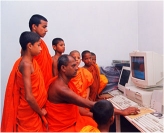
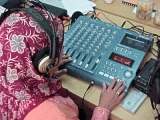
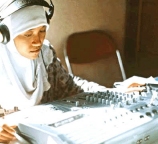
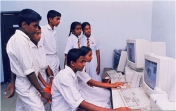
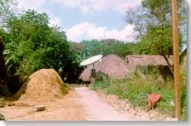 York direct to the
Himalaya or the Amazon. Will independent local radio successfully make the switch to
digital? Or will we see a two-tiered broadcasting system? -- with big commercial networks
broadcasting digitally for the urban middle classes, and independent stations on the lower
quality analogue channels, increasingly abandoned both by audiences and advertisers.
York direct to the
Himalaya or the Amazon. Will independent local radio successfully make the switch to
digital? Or will we see a two-tiered broadcasting system? -- with big commercial networks
broadcasting digitally for the urban middle classes, and independent stations on the lower
quality analogue channels, increasingly abandoned both by audiences and advertisers.

